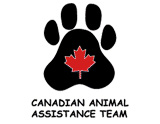Dog Rescue Information & Shelters

Photo by: Christina Conway – Dazzle by Design
What to Look for in a Rescue/Shelter
The majority of rescue organizations and shelters found in Canada are reputable and well run. However, it is important to do some research to ensure that the organization you are considering is credible. The following are just some of the things that a good organization does:
- The responsible rescue places the welfare and happiness of the animal first.
- As a first step in the adoption process, an application form should be completed. The rescue/shelter then performs careful screening of potential adopters and verifies references — the goal being to match up the right pet with the right home.
- All pets should be spayed/neutered prior to being placed and, if for any reason (ie., too young or some medical reason) spaying/neutering is not done prior to placement, this is included as a requirement within the adoption contract.
- All animals ready for adoption should have been examined by a veterinarian and be up to date on vaccines.
- All animals ready for adoption should have been temperament tested.
- The rescue/shelter should provide full disclosure about the dog, including any medical and/or behavioural problems.
- Depending on the pet to be adopted, the rescue may require that adopters participate in training classes.
- The rescue/shelter should offer ongoing support to adopters.
- A written adoption contract should be provided and should include all requirements/expectations including a clause stating that the pet must be returned to the rescue if the adopter decides to relinquish the pet.
- Rescue organizations should be able to provide references from shelters in their area and in general should be working with those shelters.
- A reputable rescue operates as a not-for-profit entity and/or registered charity.
Articles of Interest:
-
Tips for the First 30 Days of Dog Adoption
— “The first few days in your home are special and critical for a pet. Your new dog will be confused about where he is and what to expect from you. Setting up some clear structure with your family for your dog will be paramount in making as smooth a transition as possible.” — Continue Reading
-
How you Can Help with Pet Homelessness
-
How Could You?
— A poem written by Jim Willis.
Warning: This poem is extremely sad and will surely bring tears to your eyes, but if you are considering adding a pet to your family, it will remind you how important a decision that is, that they deserve no less than a permanent and loving home, and that they do indeed become a member of the family.
-
Adopting from a Shelter or Rescue Organization
— There are thousands of dogs waiting to be adopted in animal shelters across the country. They come in all shapes and sizes, purebred and mixed-breed, young puppies and senior dogs, high-energy and laid back pooches. They all have one thing in common: they want and desperately need a second chance, a new and loving family to take them in and give them a place they can truly call “home”.
-
Top 10 Reasons To Adopt A Rescue
— by Mary and Doug Clark, Labrador Retriever Rescue, Inc.
-
Save a life during National Adopt a Shelter Dog Month
-
What is a Puppy Mill?
— According to the Ontario Society for the Prevention of Cruelty to Animals (Ontario SPCA), the term “puppy mill” describes a breeding operation in which dogs are repeatedly bred for financial gain and are kept in substandard conditions. Puppy mill dogs are often confined to small cages for their entire lives and commonly suffer from various infections and parasites. A puppy mill cannot meet the needs of a dog and is a form of cruelty…Click Here to Read More from www.nopuppymillscanada.ca
-
The Canadian Federation of Humane Societies
defines a Puppy Mill as “a high-volume, sub-standard dog breeding operation, which sells purebred or mixed breed dogs, to unsuspecting buyers. Some of the characteristics common to puppy mills are:
– Sub-standard health and/or environment issues;
– Sub-standard animal care, treatment and/or socialization;
– Sub standard breeding practices which lead to genetic defects or hereditary disorders;
– Erroneous or falsified certificates of registration, pedigree, and/or genetic background.
Note: These conditions may also exist in small volume or single-breed establishments.”
For more information, visit www.cfhs.ca
Web Resources
-
No Puppy Mills Canada
—The goal of No Puppy Mills Canada is to inform the general public about Puppy Mills and what are generally termed as “Back Yard Breeders”.
-
Canadian Federation of Humane Societies (CFHS)
— The national voice of humane societies and SPCAs, bringing together those who work with, and care for animals to promote respect and humane treatment toward all animals.
-
Information for the Potential Puppy or Dog Owner
— If you are considering bringing a puppy or dog into your home, please also see this growing section of the Canada’s Guide to Dogs website for important information before you make your decision.
-
Canadian Standards of Care in Animal Shelters (CSC)
(pdf) — Establishes minimum standards of care, as well as best and unacceptable practices. The CSC was created in 2013 by a group which included Canadian animal welfare experts representing municipal shelters, private shelters and other animal welfare organizations when they got together and adopted the 2010 Association of Shelter Veterinarians Guidelines for Standards of Care in Animal Shelters for use in Canada.
-
Animal Sheltering – Rescue Groups
— “Help your rescue group make the greatest impact for pets and people. Discover advice and guidance on every aspect of rescue work, from incorporating your organization to setting the highest standards of care for every animal you help.” – Although this is a U.S. focused website, it is also a great resource for Canadian Rescue Organizations.
 Canadian Animal Assistance Team (CAAT)
Canadian Animal Assistance Team (CAAT)
Veterinary Professionals Dedicated
to the Care of Animals Worldwide
The Canadian Animal Assistance Team is a group of Veterinarians and Veterinary Technicians whose mission is to impact on the safety, health and population control of domestic animals worldwide.
CLICK HERE to learn more about CAAT.
Would you like your Rescue/Shelter listed here?
While we would like to be able to offer all not-for-profit, legitimate Rescue Organizations the opportunity to be included in the listings, we are concerned about unintentionally including organizations who are questionable in their rescue practices. Therefore, we request that all Rescue Organizations complete a Rescue Questionnaire in order to be accepted for inclusion on the website.
We do not recommend, endorse or support any one organization over another and we will never knowingly list an organization who runs a puppy mill, backyard style breeding operation, or sells their dogs (or any animal) to brokers, pet stores or retailers of any kind. We reserve the right to refuse any listing/link as well as the right to immediately remove the listing/link of any organization who has already been listed at our sole discretion.
Quick Links
Get In Touch
- Email: canadasguidetodogs@gmail.com
- Email: info@canadasguidetodogs.com
- Visit us on Facebook: www.facebook.com/CanadasGuideToDogs
— CanadasGuideToDogs.com is an Amazon Associate as well as a participant in various affiliate programs, as such fees are earned from qualifying purchases.





